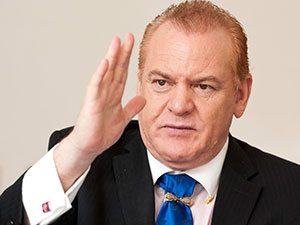
[miningmx.com] – CONVENTIONAL, labour-intensive gold mining is going to disappear as the world’s mining industry increasingly moves towards mechanisation and automation to remain viable in the face of sharply rising costs and falling ore grades, said Gold Fields CEO, Nick Holland.
“It’s coming at one hell of a speed and we need to get on the bus as well,” he said during a presentation on Thursday night on ‘the gold mining company of the future’ at the Gordon Institute of Business Science in Johannesburg.
He said the implications included the need for greater investment in local skills training to develop the skilled workforce required as well as bringing local communities on-side through partnerships and closer collaboration including greater local sourcing of goods and services.
Holland commented: “We are going to need a different kind of miner five to ten years out. That’s how close a lot of this stuff is.”
He pointed out the deep-level operations of South Africa’s gold mines were particularly at risk which was why the success of Operation Phakisa – the latest attempt by the South African government to stimulate key sectors of the South African economy including mining – was crucial.
Gold Fields owns South Deep which is the only major South African gold mine which can implement large scale mechanised mining because of the favourable geological nature of its wide ore bodies.
Large scale mechanised mining systems cannot be implemented on most other deep-level gold mines in the country because of the narrow and steeply-dipping nature of their gold bearing reefs.
According to Holland, South Deep will be the ‘last man standing’ in the South African gold mining sector which is why the group has invested $1bn into development of the mine.
Asked why he thought Phakisa might succeed where previous attempts at collaboration by government with the mining industry and organised labour had failed, Holland replied: “I would say that government is taking this seriously.
“They are engaging at the most senior level of the mining industry. The president himself – Jacob Zumba – has endorsed the programme.
“I think they have realised that we need to work out what we are going to do with the very labour intensive sectors of our mining industry – platinum and gold – which account for between 70% and 75% of total employment.
“Where there’s a will, there’s a way, but I don’t know what the outcome is going to be. We have tried for a long time to mechanise steeply-dipping, narrow, tabular orebodies. I don’t know what the solutions are, but everybody knows we have to do something quickly because we are running out of time.”
Holland commented there was scope for government to get directly involved through partnerships such as Debswana – the joint venture between the Government of Botswana and De Beers – but he added: “… government cannot create jobs. We can.
“What government needs to do is provide a competitive investment environment. Let’s have simple, clear, consistent rules that are fair and globally competitive. That’s the one message we want to make sure we drive”.











